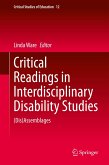This book synthesizes the latest findings on neuroplasticity and learning, drawing on rich phenomenological research carried out with teachers, psychologists, parents and students from around the world to examine the implications for current teaching and for the advancement of learning methods. Building on the author's previous work in this area, the volume considers in depth the function of feelings and emotions in neuroplastic cognition, and provides an analysis of curriculum debates and assessment systems in the light of neuroplasticity. The final chapters explore the implications of brain plasticity outside of structured learning environments and in society at large. The book will appeal to students and scholars of psychology and education, as well as to educational psychologists, coaches, teachers and educational leaders.
Bitte wählen Sie Ihr Anliegen aus.
Rechnungen
Retourenschein anfordern
Bestellstatus
Storno








